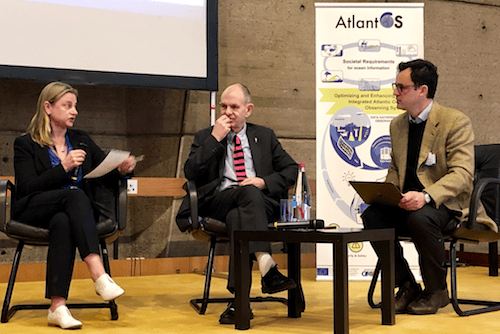
Source: AtlantOS Press Release, March 2019
On March 25-28, 2019, during a four-day long symposium at UNESCO Headquarters in Paris (France), the EU-Horizon 2020 funded Project on “Optimizing and Enhancing the Integrated Atlantic Ocean Observing System“ (AtlantOS), launched to deliver on the Galway Statement commitments, celebrated the success of four years of work involving 62 partners from 18 countries and the investment of 20 million Euros. During the symposium, a plan and ambition for the next decade of ocean observing in the Atlantic Ocean Basin to deliver on the needs of the Atlantic communities has been presented. The international meeting has been attended by scientists, policy makers, users, funders, the private sector and NGOs, about 200 participants from 20 countries.
The symposium brought together stakeholders from the ocean community to articulate and refine the joint All-Atlantic ambition for ocean observing. It provided input to the G7-Ocean group, the International OceanObs’ 19 Conference and the United Nations Decade of Ocean Science for Sustainable Development (2021-2030).
We still have too few ocean observations for our needs to document the impacts of climate change, to better predict weather an ocean induced hazards and to inform society on sustainable ocean economic opportunities. In particular, we lack good, long timeseries, data from the deep sea and data on the biology and biochemistry of the ocean. Although the Atlantic is one of the ocean basins with a higher coverage compared to other regions, there are still many gaps where we have no or limited data. One goal of the EU-Horizon 2020 Project on “Optimising and Enhancing the Integrated Atlantic Ocean Observing System“ (AtlantOS) was to enhance the observing system in the Atlantic Ocean by transitioning from a loosely-coordinated set of existing ocean observing activities producing fragmented, often monodisciplinary data, to a sustainable, efficient, and fit-for- purpose Integrated All-Atlantic Ocean Observing System as indicated in the Galway Statement. AtlantOS has already contributed in a significant way to international programmes such as the Global Ocean Observing System (GOOS), a major component of the Group on Earth Observations (GEO), its Global Earth Observation System of Systems (GEOSS), and specifically its emerging “Oceans and Society: Blue Planet” initiative.
“We celebrate the launch of the international All-Atlantic Ocean Observing System programme that connects countries from around the Atlantic Basin and observing efforts from south of the Arctic Ocean to the Atlantic Sector of the Southern Ocean,” stated Professor Dr. Martin Visbeck from GEOMAR Helmholtz Centre for Ocean Research Kiel, Germany. “We spent two years consulting with the Atlantic Ocean community to arrive at a strategic document that outlines the principles of integrated sustained observations as the basis for effective implementation and benefit sharing for the next decade” adds Brad deYoung of Memorial University, Canada, co-author of the AtlantOS Program strategy.
“The final general assembly of the AtlantOS Project (at the same time, First International Symposium of the AtlantOS Programme) in Paris gave me a sense of fulfillment after four years of hard work”, said Gianandrea Mannarini, CMCC researcher at OPA – Ocean Predictions and Applications and CMCC scientific leader of the project AtlantOS. “Many of the high-level statements initially seemingly abstract and far from every day research work finally looked more understandable to me. Also, meeting there most of the people from all around European and beyond with whom we actually delivered the project outputs was a great emotion. I was also happy to directly contribute to the event by moderation of a panel while releasing a video interview on the ship routing “success story” and providing slides on our results with the VISIR model and displaying a poster on the results from AtlantOS Task 8.3 that I lead.”
“The implementation of this ambitious AtlantOS programme is the product of the Atlantic cooperation developed to respond to the urgent needs of our Atlantic communities. It is embedded in two international policy agreements signed by the EU with international partners: the Galway Statement on Atlantic Ocean Cooperation with the USA and Canada and the Belém Statement on Atlantic Ocean Research and Innovation Cooperation with South Africa and Brazil” remarked John Bell, Director at the European Commission Directorate General of Research and Innovation (RTD) ”I look forward to the fit-for-purpose All-Atlantic Ocean Observing system serving the needs of society in 2030 and beyond”.
“The All-Atlantic Ocean Observing System (AtlantOS) highlights the importance of basin scale implementation arrangements to implement a truly Global Ocean Observing System (GOOS)” noted Dr. Toste Tanhua from GEOMAR Helmholtz Centre for Ocean Research Kiel, Germany, “as the co-chair of the international GOOS steering committee we are excited about basin scale programs and see similar developments emerging in the tropical Pacific, the Arctic, Southern Ocean and the Mediterranean”.
“A structured value adding chain from ocean observations to data management, forecast model development, downstream services, capacity building, collection of end-user requirements and then back to new and better observations is becoming crucial for a sustainable ocean development that benefits the society”, researcher Gianandrea Mannarini said. “In my opinion, the high point of the AtlantOS Symposium was probably the panel chaired by Sheila Heymans (European Marine Board). There, representatives from the largest European marine research Organizations presented the assets they will make available for a successful decade of Ocean Science for Sustainable Development (2021-2030). It was like a serious family conversation, where these big players demonstrated awareness of the enormous challenge mankind is facing for achieving a sustainable development in the ocean. We are realizing better and better how the ocean is crucial to life on whole planet and to its climate and, at the same time, how vulnerable and unknown to us it still is. No country on Earth can accomplish alone the enormous task of filling this knowledge gap and preserving the ocean environment while governing its sustainable exploitation. Multilateral cooperation is the key.”
Read more here:


